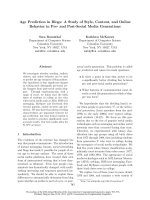Personality and social behavior
Bạn đang xem bản rút gọn của tài liệu. Xem và tải ngay bản đầy đủ của tài liệu tại đây (5.77 MB, 318 trang )
RT4509X_C000.indd i
1/3/2008 3:11:59 PM
FRONTIERS OF SOCIAL PSYCHOLOGY
Series Editors:
Arie W. Kruglanski, University of Maryland at College Park
Joseph P. Forgas, University of New South Wales
Frontiers of Social Psychology is a new series of domain-specific handbooks. The
purpose of each volume is to provide readers with a cutting-edge overview of the
most recent theoretical, methodological, and practical developments in a substantive area of social psychology, in greater depth than is possible in general social psychology handbooks. The Editors and contributors are all internationally renowned
scholars, whose work is at the cutting-edge of research.
Scholarly, yet accessible, the volumes in the Frontiers series are an essential
resource for senior undergraduates, postgraduates, researchers, and practitioners, and are suitable as texts in advanced courses in specific sub-areas of social
psychology.
Published Titles
Negotiation Theory and Research, Thompson
Close Relationships, Noller & Feeney
Evolution and Social Psycholog y, Schaller, Simpson, & Kenrick
Social Psycholog y and the Unconscious, Bargh
Affect in Social Thinking and Behavior, Forgas
Science of Social Influence, Pratkanis
Social Communication, Fiedler
The Self, Sedikides & Spencer
Personality and Social Behavior, Rhodewalt
Forthcoming Titles
Attitudes and Attitude Change, Crano & Prislin
Social Cognition, Strack & Förster
Political Psycholog y, Krosnick & Chiang
Social Psycholog y of Consumer Behavior, Wänke
Social Motivation, Dunning
For continually updated information about published and forthcoming titles in the
Frontiers of Social Psycholog y series, please visit: www.psypress.com/frontiers
RT4509X_C000.indd ii
1/3/2008 3:12:35 PM
Psychology Press
New York London
RT4509X_C000.indd iii
1/3/2008 3:12:36 PM
Psychology Press
Taylor & Francis Group
270 Madison Avenue
New York, NY 10016
Psychology Press
Taylor & Francis Group
27 Church Road
Hove, East Sussex BN3 2FA
© 2008 by Taylor & Francis Group, LLC
Printed in the United States of America on acid-free paper
10 9 8 7 6 5 4 3 2 1
International Standard Book Number-13: 978-1-84169-450-4 (Hardcover)
Except as permitted under U.S. Copyright Law, no part of this book may be reprinted, reproduced, transmitted, or utilized in any form by any electronic, mechanical, or other means, now known or hereafter
invented, including photocopying, microfilming, and recording, or in any information storage or retrieval
system, without written permission from the publishers.
Trademark Notice: Product or corporate names may be trademarks or registered trademarks, and are
used only for identification and explanation without intent to infringe.
Library of Congress Cataloging-in-Publication Data
Personality and social behavior / edited by Frederick Rhodewalt.
p. cm. -- (Frontiers of social psychology)
Includes bibliographical references and index.
ISBN-13: 978-1-84169-450-4 (alk. paper)
ISBN-10: 1-84169-450-9 (alk. paper)
1. Personality. 2. Social psychology. I. Rhodewalt, Frederick Thomas.
BF698.P47 2008
155.2--dc22
2007035776
Visit the Taylor & Francis Web site at
and the Psychology Press Web site at
RT4509X_C000.indd iv
1/3/2008 3:12:36 PM
Contents
About the Editor
Contributors
1.
Personality and Social Behavior: An Overview
vii
ix
1
Frederick Rhodewalt
2.
Beyond Person and Situation Effects: Intraindividual Personality
Architecture and Its Implications for the Study of Personality and
Social Behavior
9
Daniel Cervone, Tracy L. Caldwell, and Heather Orom
3.
The Self and Social Behavior: The Fragile Self and Interpersonal
Self-Regulation
49
Frederick Rhodewalt and Benjamin Peterson
4.
Contextual Variability in Personality: The Case of the Relational
Self and the Process of Transference
97
Susan M. Andersen, S. Adil Saribay, and Christina S. Kooij
5.
Ties That Bind: Linking Personality to Interpersonal Behavior
Through the Study of Adult Attachment Style and Relationship
Satisfaction
117
W. Steven Rholes, Ramona L. Paetzold, and Mike Friedman
6.
Different Toolkits for Different Mind-Readers: A Social-Cognitive
Neuroscience Perspective on Personality and Social Relationships
149
Geraldine Downey, Jamil Zaki, and Jason Mitchell
7.
Personality, Individuality, and Social Identity
177
Michael Hogg
v
RT4509X_C000a.indd v
1/3/2008 2:33:52 PM
vi
CONTENTS
8.
Leadership as Dynamic Social Process
197
Martin M. Chemers
9.
Personality and Prejudice in Interracial Interactions
223
Patricia G. Devine, Frederick Rhodewalt, and Matthew Siemionko
10.
Social Psychological Processes Linking Personality to Physical
Health: A Multilevel Analysis With Emphasis on Hostility and
Optimism
251
Bert N. Uchino, Allison A. Vaughn, and Sonia Matwin
Author Index
285
Subject Index
299
RT4509X_C000a.indd vi
1/3/2008 2:34:00 PM
About the Editor
F
rederick Rhodewalt received his PhD in social psychology from Princeton
University in 1979. His primary research explores the interpersonal construction and maintenance of self and includes topics such as self-handicapping and narcissism. He is Professor of Psychology and Associate Dean of the
Graduate School at the University of Utah. Dr. Rhodewalt is a former editor of
Personality and Social Psychology Bulletin and Basic and Applied Social Psychology. In 2003, he was awarded the Distinguished Service Award to the Disciplines of Social and Personality Psychology by the Society for Personality and
Social Psychology.
vii
RT4509X_C000a.indd vii
1/3/2008 2:34:00 PM
RT4509X_C000a.indd viii
1/3/2008 2:34:01 PM
Contributors
Susan M. Andersen
New York University
New York, New York
Sonia Matwin
University of Utah
Salt Lake City, Utah
Tracy L. Caldwell
North Central College
Naperville, Illinois
Jason Mitchell
Harvard University
Cambridge, Massachusetts
Daniel Cervone
University of Illinois at Chicago
Chicago, Illinois
Martin M. Chemers
University of California, Santa Cruz
Santa Cruz, California
Heather Orom
Karmanos Cancer Institute
Detroit, Michigan
and
Institute of Gerontology
Wayne State University
Detroit, Michigan
Patricia G. Devine
University of Wisconsin–Madison
Madison, Wisconsin
Ramona L. Paetzold
Texas A&M University
College Station, Texas
Geraldine Downey
Columbia University
New York, New York
Benjamin Peterson
University of Utah
Salt Lake City, Utah
Mike Friedman
Texas A&M University
College Station, Texas
Frederick Rhodewalt
University of Utah
Salt Lake City, Utah
Michael Hogg
Claremont Graduate University
Claremont, California
W. Steven Rholes
Texas A&M University
College Station, Texas
Christina S. Kooij
New York University
New York, New York
S. Adil Saribay
New York University
New York, New York
ix
RT4509X_C000a.indd ix
1/3/2008 2:34:01 PM
x
CONTRIBUTORS
Matthew Siemionko
University of Utah
Salt Lake City, Utah
Allison A. Vaughn
University of Utah
Salt Lake City, Utah
Bert N. Uchino
University of Utah
Salt Lake City, Utah
Jamil Zaki
Columbia University
New York, New York
RT4509X_C000a.indd x
1/3/2008 2:34:01 PM
1
Personality and Social Behavior
An Overview
FREDERICK RHODEWALT
University of Utah
T
his volume is about personality and social behavior. It surveys a wide variety of research domains with roots in the two disciplines in an attempt
to understand the transactions between persons and their social worlds.
The organizing questions are (a) How do characteristics of the person drive and
shape interpersonal behavior? and (b) How do features of the social environment
constrain and elicit behaviors from the individual? These are not new questions.
However, there are new and evolving answers. It can be argued that the “emerging
symbiosis” (Swann & Selye, 2005) between the disciplines of social and personality psychology is evidenced in the new and exciting approaches to addressing the
personality and social behavior questions put forth in the following chapters.
Evidence for such symbiosis between the fields of personality and social psychology may be found in current textbook definitions of the two disciplines. Consider the following:
Personality is the complex organization of cognitions, affects, and behaviors
that gives direction and pattern (coherence) to the person’s life. …personality
consists of both structures and processes and reflects both nature (genes) and
nurture experience. (Pervin, 1996, p. 414)
Social psychology is the scientific study of how people think about, influence,
and relate to one another. (Myers, 2007, p. 4)
As these two representative definitions suggest, contemporary views of personality and social psychology share much overlap in their central concerns. Although
social psychology places greater emphasis on the interpersonal aspects of the
1
RT4509X_C001.indd 1
1/3/2008 11:00:10 AM
2
PERSONALITY AND SOCIAL BEHAVIOR
person, both fields are interested in systematic study of the thoughts, emotions, and
behaviors of the person, and both acknowledge that people behave in contexts. This
rapprochement is a marked departure from more classic definitions of the respective fields, personality being the study of individual differences and social psychology being the investigation of the impact of the situation on the individual.
Such “balkanization” of the disciplines set the stage for the person-situation
debate of the 1970s and 80s. Ignited by Walter Mischel’s (1968) trenchant critique
of traditional trait approaches, specifically that behavior is highly situation-specific
and not cross-situationally consistent, the ensuing discussion and research contributed to a number of useful and some not so useful developments in the fields
of personality and social psychology. First, it forced trait theorists and social psychologists to be more precise in defining their constructs and to clarify what their
theories contended about the control and coherence of behavior. For example,









